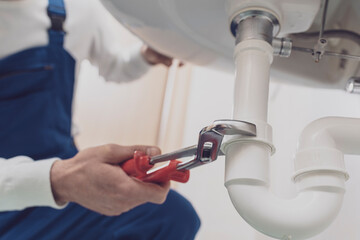If you’re a do-it-yourselfer, there are some ways to repair a plumbing emergency yourself. You can try these home remedies before calling an emergency plumber if you have burst pipes, a clogged drain, or a gas leak. Just make sure to follow these tips to avoid an emergency plumbing situation.

Do-it-yourself plumbing repairs are a great way to save money and time. However, some repairs are better left to a professional. Performing repairs on your own can be dangerous and lead to more problems than you might imagine. When in doubt, call Plumbing Company they can fix your plumbing problems properly and efficiently.
Before attempting any DIY plumbing repair, finding and shutting off the main water valve is important. This valve is often located near the water meter or on the street. It may also be on the front or side of the house. Before you begin, gather the tools you’ll need to complete the repair. Depending on the problem, you may need various types of tools. Also, make sure to keep the area around the pipe isolated to avoid any problems in the future.
If you need an emergency plumber for burst pipes, there are a few things you need to know. While the repairs are usually minor, you may need to replace some water-damaged materials. Mold and mildew can also cause health issues. To prevent these issues, move things off the floor as much as possible. Also, protect pipes with insulation and steel hoses. You can also cover hard floors with rugs to reduce water damage.
The price of emergency plumbing services can vary significantly, so make sure you compare prices before making your final decision. Some will charge by the hour, while others will charge a flat rate for the job. Some companies offer low monthly rates or will give you a discount if the job is bigger.
Clogged drains can cause flooding in a house. The water can be contaminated and even lead to a sewage backup. Even a small bathroom flood can cause a serious problem with your drainage system. A professional plumber is an excellent option when this happens. The plumber will diagnose the problem and provide options for repair.
There are many reasons why your drains can become clogged, but they can be a huge inconvenience. Common culprits are soap, grease, and other items you flush down the drain. Other causes include mineral buildup. The best way to prevent clogging is to avoid flushing any of these items down the drain.
Gas leaks can pose a huge health risk to you and your family. They can produce a strange odor and dangerous gases, such as carbon monoxide. Watching for signs of gas poisoning, such as headaches and fatigue, would be best. It’s important to call a plumber as soon as you suspect a leak.
It would be best if you looked out for several things, such as worn-out connections or broken seals, which can cause serious problems. Calling an emergency plumber is a good idea if you have any of these issues, and ensure you get same-day service. A plumber can handle plumbing and gas, but a gas fitter works exclusively with gas and its related plumbing. However, there is some overlap between the two fields.
Overflowing toilets can be caused by various problems, including a broken pipe or system drain. Luckily, there are several things you can do to prevent them and avoid calling a plumber. If you’re having trouble with your toilet and it is overflowing, you may need the services of an emergency plumber.
The most common cause of overflowing toilets is a clogged drain or clog. Typically, you can clear the clog yourself with a plunger, but you should call a plumber in severe cases.
Sewage backups can be a disaster, and it’s a good idea to learn how to prevent them before they happen. Tree roots, too much rain, and melted snow can damage the pipes in your home, causing sewage to back up. If you have a sewer line that is part of the city’s system, you can do a few things to prevent a sewer backup from happening in your home. However, if you experience a sewer backup in your home, it’s best to call an emergency plumber immediately. You should also turn off the electricity to the affected area and move any salvageable items out of the contaminated area.
A plumber can also help you determine whether you have a clogged pipe. A clogged pipe is the most common reason for a sewer backup. Other common causes include sanitary products, diapers, hair, and other foreign objects. When you call an emergency plumber, they can evaluate the problem and recommend repairs that prevent future backups.
